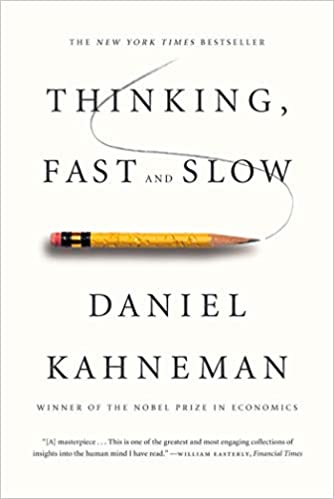Decision making is the most important job of any business executive. Mistakes can be costly and could ruin a career and a bad decision could threaten the entire future of a company.
The problem is that decision makers are only human and as we are all prone to errors of judgement sometimes (I knew I shouldn’t have worn that shirt, had that last drink, chosen the linguine) it is important to have a smart decision making process in place as a safeguard to making bad choices in a business setting.
Unlike day to day decision making, business decision making can have far reaching consequences.

Thinking Fast and Slow
by Daniel Kahneman
⏱ 12 minutes reading time
🎧 Audio version available
Avoid acting on impulse
Acting on impulse is usually an emotional response to a decision that is based on feelings and not logic. If you are a business executive and accustomed to making fast paced snap decisions it can be easy to fall into this trap in order to get things done. However it is often a mistake. You can’t let your subconscious feelings outweigh considerations of finance and the understanding of the long term implications of the decision. And without time to assess all the data, if your snap decision does pay off, it will be more about luck than judgement.
If you tend to err towards acting on impulse, always refuse to be pressurised into making trigger decisions even if your emotions are pushing you in a certain direction.
The best way to get round this issue is to always ask for more time and then use this period wisely researching and examining all sides of the decision. This period of reflection gives you time for the emotions to cool.
If you recognise that you have a tendency to impulsive behaviour, self awareness will help you step back from the brink and become more measured in your decision making behaviour.
Don’t stay in an echo chamber
It is tempting to seek out like minded individuals who always agree with you but staying in an echo chamber where everyone thinks the same, will not help you with decision making. It’s called confirmation bias and although it can be comforting to hear affirmation that you are making the right decision, you may find that this type of group will agree with anything you say, simply because it is you!
If you are a leader, you need to ask yourself whether you are looking for confirmation of your decision, or if you are genuinely looking for evidence to prove that it is the right choice.
It is important to have people you can trust around you, who are not scared of voicing an opposite opinion. That way you should be able to see all sides of the situation and gain a wider perspective on issues you may not have previously considered.
Think about the consequences before you commit
In any company, the decisions you make will likely have direct and indirect consequences on your team and your company right down to ground level. So for example if you have the brilliant idea to move head office, change working hours ,or sack all your staff and replace them with agency workers these decisions which may seem like abstract concepts at board level are likely to cause an emotional response further down the line.
Many business leaders base their decisions on their own egos without considering the long term impact on colleagues and the workforce. These types of decisions often seem right at the time but can cause long term fall out throughout the company, often with disastrous consequences
If you have a tendency to lead your company like an army general, it is crucially important to consider the consequences of your actions. Companies that stay true to core values and consider priorities and values are more likely to succeed and function more effectively than those that don’t. Weighing up the pros and cons of any decision will help you anticipate potential problems and deal with them before they arise.
Don’t reduce every decision to a binary choice
Many decisions are made based on a choice of two actions such as, “should I choose option A or should I choose option B.”. However in most cases decision makers are so busy weighing up the pros and cons of options A and B, they forget that other options are also available.
This type of decision making is called narrow framing because it restricts the decision maker into narrow behaviour and this can be very risky in business. This is because a choice between two options is always based on comparing one against the other , for example option A is more expensive than option B, yet another option which is not on the table such as option C , D or E may prove to be the best solution all round.
To guard against narrow framing it is important to keep your business objectives in mind and to think outside the box when searching for solutions. One way of doing this is to imagine that A and B do not exist and to search for other solutions.
The solutions you get to may challenge your preconceptions but by keeping an open mind that weighs up all the possibilities , your decision making is far more likely to be effective than reducing every decision to a binary choice.
Remember that not all decisions will work
It is important to remember that even smart business choices can have bad consequences. Nobody can accurately predict the future 100% of the time and even a good decision made at the time can look bad in hindsight. The good news is that by implementing these four decisions making tactics and keeping an open mind to potential solutions, your business decisions are more likely to be effective than rushing into something based on your ego or feelings.
What Is Snapreads?

With the Snapreads app, you get the key insights from the best nonfiction books in minutes, not hours or days. Our experts transform these books into quick, memorable, easy-to-understand insights you can read when you have the time or listen to them on the go.


